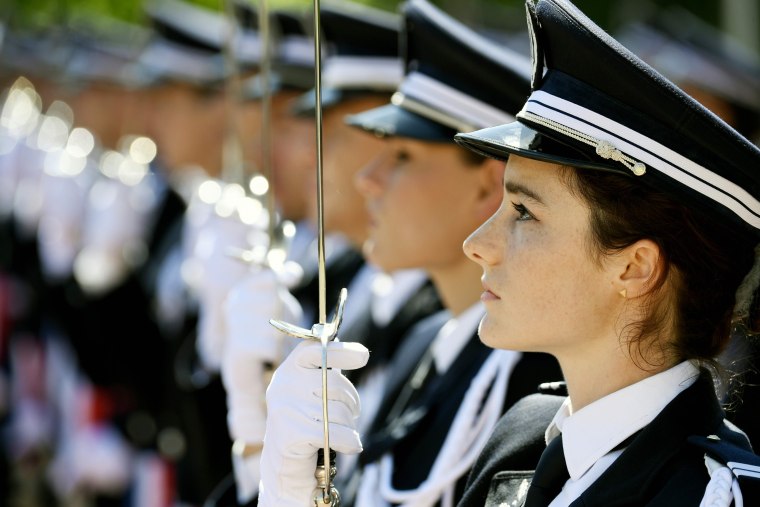Part Four in a Series
PARIS — The police vehicles approached slowly, and the officers accompanying them were visibly tense.
The past three days had been a nightmare for French law enforcement. Two officers murdered on the street in cold blood. Nine staff from the provocative magazine Charlie Hebdo slaughtered in their offices, along with a visitor from out of town. Four people slain at a kosher supermarket.
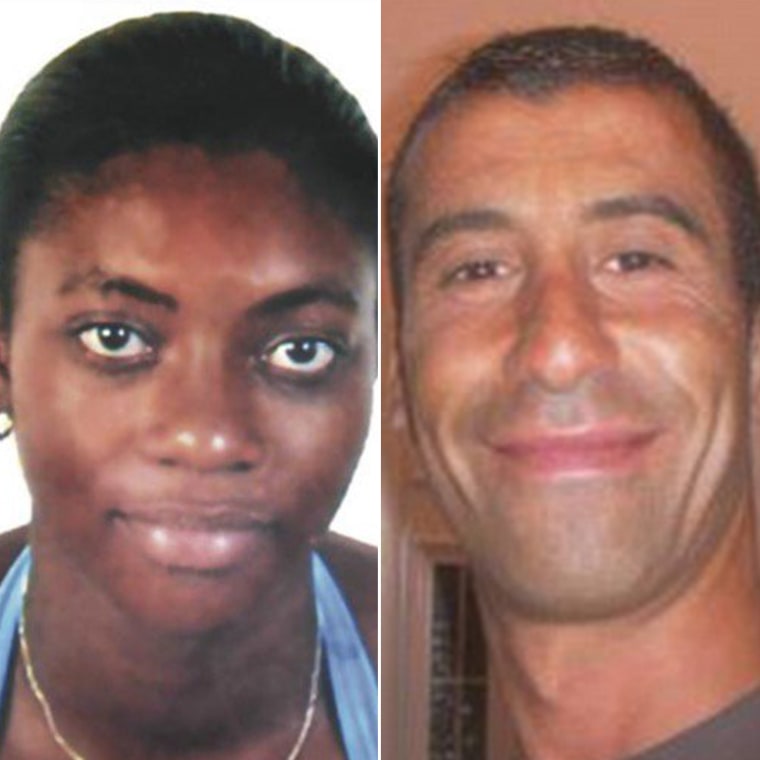
Two sieges ending in a hail of bullets with brothers who had sworn allegiance to al Qaeda in the Arabian Peninsula and their ISIS-inspired accomplice being killed following a coordinated set of attacks.
A video taken by a passerby showed the street packed tight with civilians, and the officers began clearing a path for the approaching vehicles. A few small cheers rang out. But as the police got closer, the entire crowd erupted in applause and shouts of encouragement.
The officers were clearly taken aback, exchanging glances as if unsure how to respond.
But the crowd’s encouragement and enthusiasm were contagious, and many of the officers, replete in full riot gear, began to smile and thank their supporters.
"People need heroes in a time of war"
With its long history of anti-establishmentarianism and a general lack of regard for authority figures, France has never really embraced police officers in the way that America often mythologizes the men and women of the thin blue line.
Cops here are widely known as "les flics" — the plural of "flic," a popular slang term for police of uncertain origin.
But on Jan. 12, 2015, it was "les flics" who had responded to the call, and come to the rescue.
The citizens of France loved them for it.
'The French Intifada'
There had long been animosity between the police and immigrant communities, who had felt unjustly targeted by law enforcement. The police and their supporters pointed to high levels of crime in the "banlieue" — or suburbs — and a lack of “assimilation” by immigrant populations.
Experts interviewed by NBC News say there is very little focus on police relations with immigrant communities, which are the same communities which are ripe for ISIS propaganda. It is no accident that many of the young men and women who have been radicalized began their journeys in French suburbs, or have records of petty crimes.
“There is an enduring will to lay a veil of ignorance on policing practices, even when they are relatively good compared to other nations,” said Professor Sebastian Roché, a researcher who focuses on policing and youth crime at France's National Center for Scientific Research. “President Hollande has reneged on his promises. He has forgotten about tackling ethnic bias during stop-and-searches. He has forgotten the banlieues.”
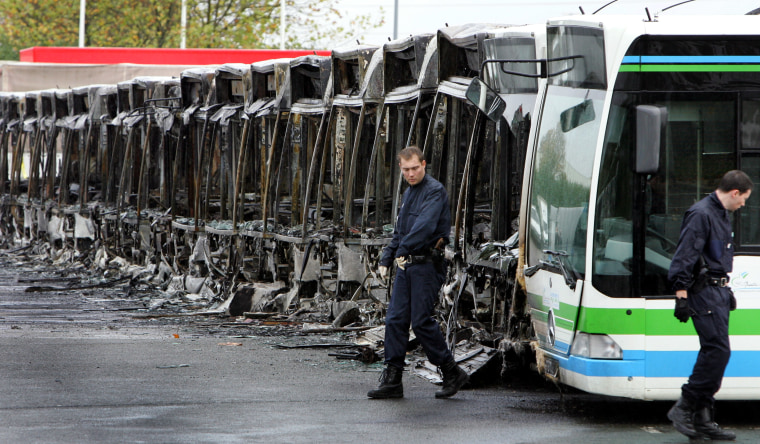
According to INSEE, the French national institute of statistics, about one-in-five people in France is foreign-born, or is the direct descendant of at least one foreign-born parent. In the greater Paris region, this proportion climbs to two-in-five. Half of all immigrants or their descendants are North African, Middle Eastern or African in origin.
Deep and lasting fractures have triggered major riots in the past — including nearly a month of massive protests, looting and arson that prompted then-President Jacques Chirac to declare a state of emergency in 2005. The media dubbed the events "The French Intifada."
The shift in popular attitudes toward the police and armed forces peaked shortly after last November's attacks that killed 130 people and injured hundreds more. Waves of new recruits began applying to become police officers and soldiers.
Complete Coverage: Paris Terror Attacks
“People need heroes in a time of war: the police are good candidates,” Roché added. “France has a national police service, and this strengthens even more the connection between a sense of nationhood, and positive attitudes towards the police.”
The Police Nationale, France’s largest law enforcement organization, has seen such a surge in interest in wake of last year’s attacks that earning a slot at its police academy is now as competitive as gaining a place in the nation’s top universities.
The police have been quick to capitalize on the shifting attitudes, in part because they must meet new staffing levels under national reforms aimed at preparing France for further terror attacks.
Indeed, the police unveiled a new recruiting campaign that focuses heavily on the themes of patriotism and terror.
“I wanted to commit myself to be helpful to others,” says a character dubbed “Pierre,” in a slick Police Nationale recruiting video.
It begins with Pierre visiting a impromptu memorial to the Nov. 13 attacks dressed as a civilian, and ends with him hoisting the national flag in uniform before a formation of fellow recruits at the National Police College in Saint-Cyr-au-Mont-D’Or, all set to rousing music.
“After the attacks in Paris and Saint-Denis last November, the government decided to initiate a huge wave of recruitment for the [Police Nationale],” said Superintendent Camille Chaize, its deputy chief of communications. “We organized an exceptional exam last January. There were 36,000 candidates for the exam. It’s almost 50 percent more than usual.”
Meanwhile, the government is trying to translate this surge of interest into, eventually, more officers on the street.
“For this year, we will recruit 5,000 new police officers," Supt. Chaize said. “It’s 10 times more than we usually have.”
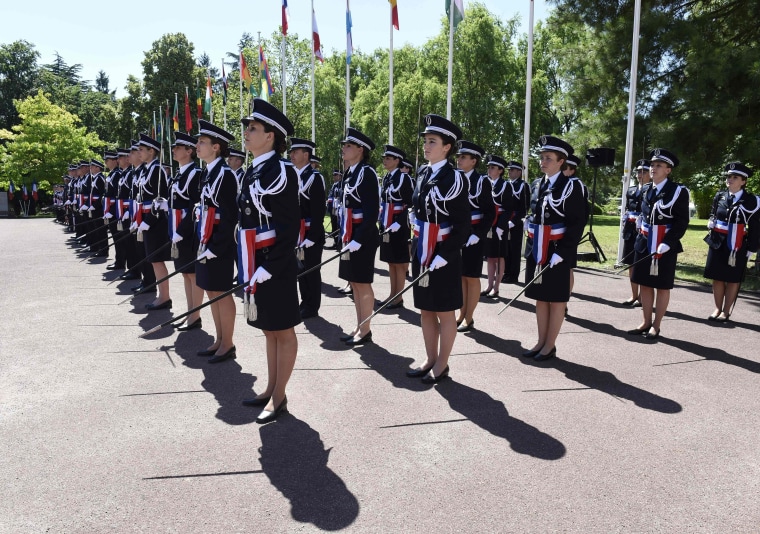
Still, once a prospective recruit has decided to commit to the path of becoming an officer, it takes perhaps a year or more to earn a place at the academy, complete the necessary training, and finally join the ranks of the police.
The attacks may have reinforced their sense of mission, but current recruits understand that fighting terrorism may actually be a small part of their day-to-day job.
“Actually, the terror attacks did not motivate me more, as I was already determined to become a police officer,” said recruit Gregory Claire, 31, who is currently attending the police academy. “Most of my training at the academy is about daily criminality. It is about recognizing infractions of the law, and about how to be a good police officer.”
“Today we need police, but not only to prevent terror attacks,” said Alexis, 20, an intern at police headquarters who is waiting for placement at the police academy, and who requested that his last name be withheld. “It’s very important to defend this country, but we don’t have to only focus on terrorism. We have to carry on with life.”
Molotov Cocktails
The flag-waving patriots who emerged after the series of ISIS-linked terror attacks were quick to cheer the police in January, and again in November.
But by March, when President Francois Hollande tabled a set of contentious reforms to French labor laws that enraged unions and social activists, hundreds of thousands took to the streets in protest.
Most of these demonstrations took on the usual flavor of strike actions in France: loud, chaotic and regular.
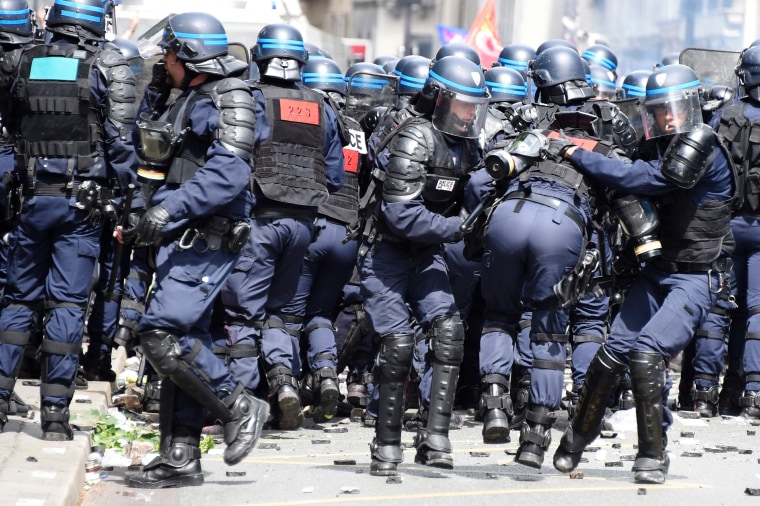
The police returned to a familiar pattern as well, responding in force. Soon the protests turned violent, and demonstrators were filmed hurling Molotov cocktails and rocks at police, who turned to batons, tear gas and water cannons.
The sentiment of the protesters quickly turned against the police. Uniformed patrol officers who were not part of riot-control squads even began to be attacked.
In one particularly dramatic incident captured on video and replayed endlessly on French TV, protesters set alight a police car while two officers were still inside.
The vehicle was destroyed, but the duo managed to escape.
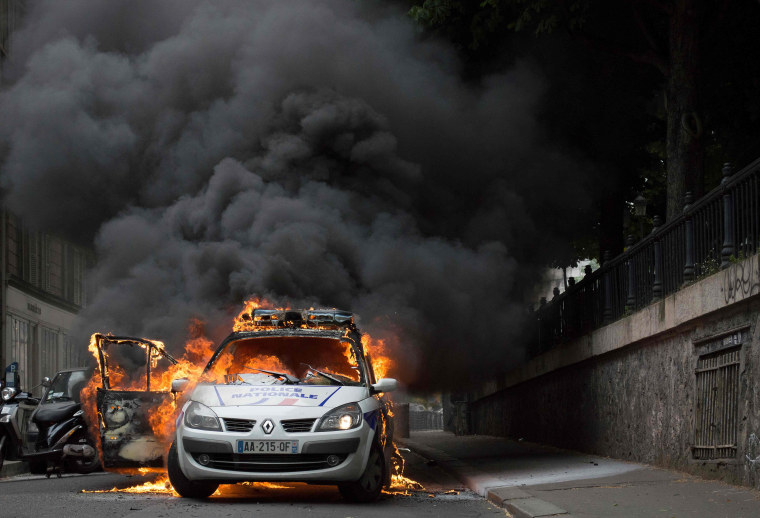
An American who had traveled to France, apparently to join the protests, was later arrested and now stands charged with attempted murder. The incident occurred at a rally held by police unions to protest violence against their officers.
The French honeymoon with the police appeared to have ended.
"We are back to 'normal,'" said Roché, the professor. "Clashes between police and students, tensions in the banlieue [suburbs], altercations during the policing of protests: this is the worst period for trying to reform the police."
